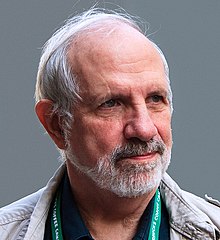
Back براين دي بالما Arabic براين دى بالما ARZ Brian De Palma AST Brayan De Palma Azerbaijani Браян Дэ Пальма Byelorussian Брайън Де Палма Bulgarian Brian de Palma BS Brian De Palma Catalan Brian De Palma Corsican Brian De Palma Czech
Brian De Palma | |
|---|---|
 De Palma in 2009 | |
| Born | Brian Russell De Palma September 11, 1940 Newark, New Jersey, U.S. |
| Alma mater | |
| Occupations |
|
| Years active | 1960–present |
| Spouses |
|
| Children | 2 |
Brian Russell De Palma ([de ˈpalma]; born September 11, 1940) is an American film director and screenwriter. With a career spanning over 50 years, he is best known for work in the suspense, crime and psychological thriller genres. De Palma was a leading member of the New Hollywood generation.[1]
Carrie (1976), his adaptation of Stephen King's novel of the same name, put him on the map. He enjoyed commercial success with Dressed to Kill (1980), The Untouchables (1987) and Mission: Impossible (1996) and made cult classics such as Sisters (1972), Phantom of the Paradise (1974) and The Fury (1978).[2][3]
As a young director, De Palma dreamed of being the "American Godard". His style is allusive; he paid homage to Alfred Hitchcock in Obsession (1976) and Body Double (1984); Blow Out (1981) is based on Michelangelo Antonioni's Blowup (1966) and Scarface (1983), his remake of Howard Hawks's 1932 film, is dedicated to Hawks and Ben Hecht. His work has been criticized for its violence and sexual content but has also been championed by American critics such as Roger Ebert and Pauline Kael.[2][4][5] In 2015, he was interviewed about his work in a well-received documentary by Noah Baumbach.[6]
- ^ Murray, Noel & Tobias, Scott (March 10, 2011). "Brian De Palma | Film | Primer". The A.V. Club. Retrieved February 3, 2012.
- ^ a b Rose, Steve (September 8, 2006). "Steve Rose Talks to Director Brian De Palma". The Guardian. Retrieved June 18, 2018.
- ^ "Director Brian De Palma's underrated gems, decade by decade". Los Angeles Times. June 10, 2016. Retrieved March 10, 2022.
- ^ Cite error: The named reference
KaelBOwas invoked but never defined (see the help page). - ^ Cite error: The named reference
FemmeFataleEbertwas invoked but never defined (see the help page). - ^ Peter, Sobczynski. "De Palma". RogerEbert.com.